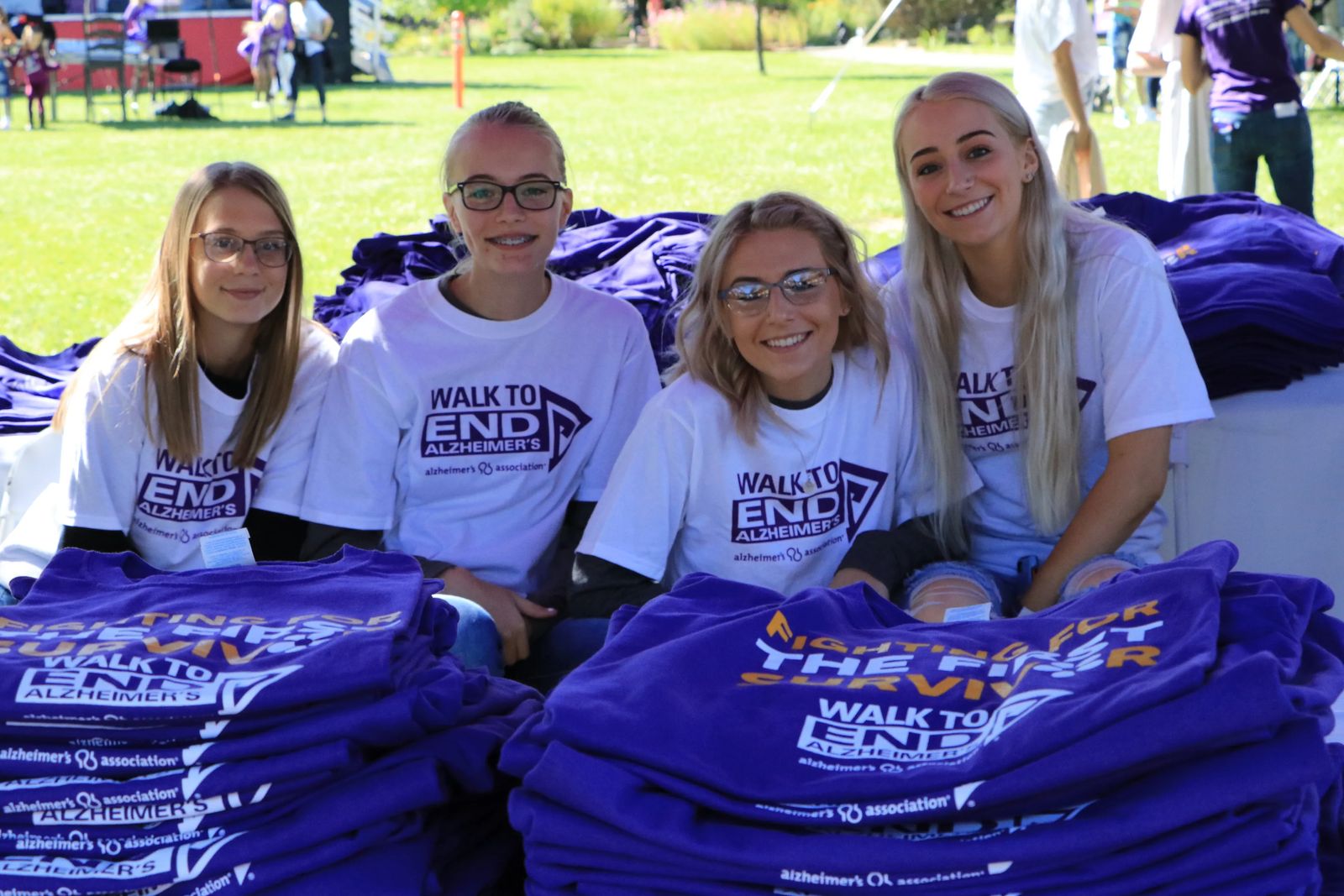
Finding Your Way: When Alzheimer’s Affects Someone You Love
November 1, 2019 | by brooke wagner | photo courtesy of trisha payer
Perseverance. Passion. Grace. These are only a few of the words that come to mind after spending time with Lynn Mullowney Cabrera, Executive Director of the Montana chapter of the Alzheimer's Association. Not just a job, Cabrera's work is truly her calling and a cause that she fights for with an unwavering spirit as she educates families about Alzheimer’s disease. Cabrera has served as Executive Director since 2015, but her work with the organization began many years before in 2006. Through fundraising efforts, educational presentations, and literally walking side by side with families who have been affected by dementia and Alzheimer’s, Cabrera is a light of hope in what can often be a dark diagnosis. A Montana native, Cabrera knows the specific challenges rural Montanans face, and the potential for lack of resources and services for those affected by Alzheimer’s and dementia.
The headquarters of the Montana Alzheimer’s Association is located in Billings, though the impact of this organization stretches statewide. It is estimated that by 2025, the number of people in Montana living with Alzheimer's will reach upwards of 27,000, an unsettlingly high number. Nearly six million people across the nation are living with Alzheimer’s, with another 15 million family members serving as caretakers for their loved ones. Caregiving takes an emotional, financial and physical toll; families often feel isolated, not knowing where they can turn for help and support.
One such family is that of Trisha Payer. Her mom was diagnosed with Alzheimer's at only 63 years of age. According to the Alzheimer’s Association, Alzheimer’s is not just a disease of old age. Younger-onset (also known as early onset) Alzheimer's affects people younger than age 65. Nationwide, up to 5 percent of all affected have younger onset. This diagnosis is especially cruel; adult children are found in the position of being both a caregiver to their parent as well as being a parent themselves. This was the case for Trisha, who had three young daughters at home at the time of her mom’s diagnosis. Pat Baker, Trisha’s mom, started showing signs of something being amiss in 2013. Pat would occasionally forget recipes that she had made all her life, and eventually, her memory struggles began to affect her job at the local courthouse. Co-workers noticed, but Trisha recognizes her family was initially in denial about what was happening. With no history of Alzheimer’s or dementia in their family, Trisha says it was hard to admit that there might be something drastically wrong.
The week Pat was diagnosed with Alzheimer’s, Trisha began to seek out resources to help navigate this new and frightening season. She quickly came across the website for the Alzheimer’s Association, and she and her family signed up for the Walk to End Alzheimer’s that was happening the very next week. She credits her daughters and her husband for pulling together and supporting her as she, in turn, cared for her mom, who began to require more and more hands-on care to manage the disease. Trisha would drive from her family’s home in Forsyth to her parent’s farm in Lustre, a four-hour trip, one way. She would spend several days taking care of her mother and supporting her dad as he struggled with health issues of his own and a diagnosis of Multiple sclerosis. Then she would drive back home to care for her own family before once again making the trip back to Lustre to her mom’s side. Trisha states that they never tried to hide what was going on from their daughters, even though it may have been tempting to shield them from the scary moments a diagnosis of Alzheimer's can bring. She says, “We have three amazing, loving girls with compassionate hearts who also wanted to help my mom and dad. Whether it was just sitting with her (Pat) or having a dance party in the living room, my girls were supportive of what we were doing.” The youngest of four siblings herself, Trisha, recognizes the group effort it took to keep her mom safe and at home for nearly her entire journey with Alzheimer’s. Trisha’s older brothers and sister shared the care of their mother by taking turns staying with her, reassuring her, and taking her to doctor’s appointments.
Trisha tells a story that paints a picture of the effect Alzheimer's can have not only on the person who is diagnosed but on their family members and caregivers as well. She says, "One morning, my dad called me and said, 'Your mom doesn't remember who I am.' I knew I had to go, so I quickly got our girls off to school and then called my mom to let her know I was coming for a visit. I got in the car and drove the 4 hours to my parents' house, praying the whole way for guidance and direction on what to do when I got there. When I arrived, my mom was watching out the window. She said, 'What are you doing here?' I reassured her that I had just come for a visit. I could tell that she didn't remember my name but knew that she loved me and was safe with me. I sent my dad for a drive to get some air. I decided to take my mom in to see her neurologist in Williston, North Dakota, and they were able to get her an appointment that day. After an exam, they upped her medication, and we drove back to my mom's home. Later in the day, I could tell my mom was becoming more upset. I was in the living room and noticed her peeking around the corner at me. As I went outside to grab something out of the car, I heard her ask my dad, 'Who is that lady?' My dad replied, 'That's our daughter.'"
Trisha emphasizes that although it was challenging to care for a mom who didn't always remember who she was, there were many bright moments through it all. Although her mom struggled to remember details of her life, she could often recall entire songs and sing them with her family. Trisha describes the incredible hugs her mom gave, even up until the end of her life, saying that her mom would hold on tightly before reluctantly letting go of the person she was embracing. "What I want people to know is that there are still good moments – somewhere in there, they are still there." Faith was an essential part of Trisha's upbringing, and she expresses gratefulness for the foundation of hope that carried her through the dark days of her mom’s diagnosis. Trisha chose to focus on what her mom needed instead of what her own needs may have been. She says, "I tried to always put myself in her shoes and ask how I could help her be okay with wherever she was that day." By entering into her mom’s world instead of demanding that Pat join hers, Trisha brought comfort and reassurance to what could quickly escalate into a stressful situation. "Respect the fact that they are still adults, and they still want to feel self-sufficient. Don't remind them that they can't remember."
After spending Easter weekend with her mom and family, Trisha got the call that she had been dreading since the day of her mom's Alzheimer's diagnosis. Pat Baker passed away on April 21st, 2016, at the age of 66. Although her mom was gone, Trisha knew that her work to help other families affected by this disease was just beginning. She now serves as the primary caregiver for a neighbor with Alzheimer’s, and advocates for the sense of support and resources the Alzheimer’s Association provides. Trisha and her family walk every year in the Walk to End Alzheimer’s, under the team name “P.S. I Love You" – a tribute to both her mom and an aunt lost to the disease. In many rural communities throughout Montana, neighbors helping neighbors and stepping up to care for those around them is the norm. Trisha is paying it forward and says she feels honored to be able to be a part of the lives of those struggling with Alzheimer’s. Her dream is to one day open specialized memory care facilities in rural areas across Montana, bringing quality care with a "close to home" feel to patients and families. She closes by saying, "At the time we were going through it, we felt alone. I never want anyone else to feel like they are alone, or that there's not help or resources."
Resources
If you or a loved one is struggling with memory problems or cognitive concerns, the Alzheimer’s Association is available to help through their website, www.alz.org. Here, families find support for every step of the journey, from information about symptoms and stages of the disease to entire sections dedicated to caregivers and those living with dementia.
When individuals or families have concerns about memory loss, the Alzheimer's Association provides invaluable resources, referrals and care consultations through their no-cost Helpline, available 24 hours a day, 7 days a week at 800-272-3900. A tab on their website links to www.alzconnected.org, a free online community for anyone affected by the disease, including individuals with Alzheimer's, family members, or anyone who has lost a loved one to dementia.
Originally printed in the November 2019 issue of Simply Family Magazine
Never miss an issue, check out SFM's digital editions here!





